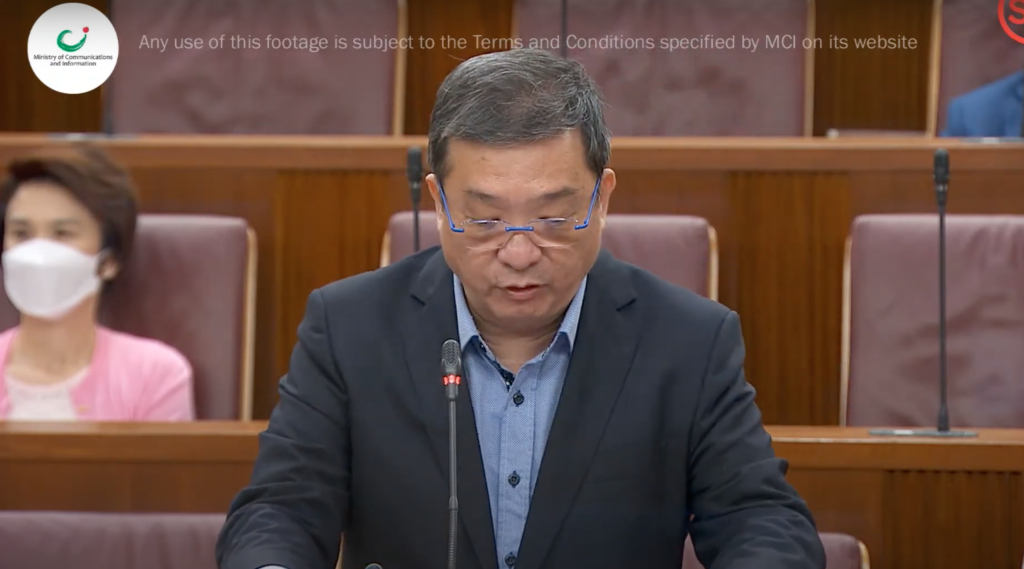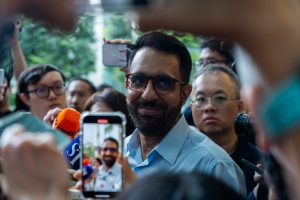Top Image: Tey Liang Jin for Rice Media
“Mr Speaker, partnership has been the anchor of our efforts to overcome the challenges posed by the pandemic, but also to emerge stronger. Industry partners have stepped up with initiatives to restructure our economy and create new opportunities. The Government will continue to work with partners from the people and private sectors to strengthen the digital ecosystem. This way, government-led programmes and community initiatives can complement each other and create greater value for Singaporeans. We must turn challenges into opportunities by leveraging our small size to pivot faster and respond more nimbly than our competitors.
Moving further upstream, do we have the talent and talent networks to continuously innovate, to improve our processes and quality control? We can no longer merely be a place of arbitrage, and we have to provide support to SMEs for more fundamental purposes: digitalising, penetrating new markets, and streamlining work processes. Our strategy is to entrench ourselves in the critical niches of the global value chains.”
ADVERTISEMENT
If you glossed over this whole paragraph, you’d be forgiven for doing so. You are not alone.
Unfortunately, it’s also a compilation of actual quotes from this year’s Budget Debate.
I was excited when Parliament introduced live-streaming of its proceedings earlier this year. Instead of relying on delayed video clips or having to be there at Parliament, I would be able to follow the Budget Debate from home—the first time this has been done.
Yet I almost dozed off trying to follow more than 71.5 hours worth of speeches by 65 speakers. You can hardly blame me when speeches resemble the above paragraph. Mainstream media did not help either by reporting those speeches almost verbatim.

Because the Budget Debate is important, it should not be so underwhelming. It should capture our attention, as it tells us how the Government has determined how money will be spent for the year. The budget season is also when ministers make major policy announcements.
Instead, MPs droned on with motherhood statements and polysyllabic buzzwords that, while impressive sounding, no one understood. Mariam Jaafar, an MP for Sembawang GRC, nailed it when she said that many Malays don’t know what the community initiative M3 stands for, even though it has already been established for two years.
I too struggled to understand M3 even after glancing at the description on its website. The description of M3’s role is padded with non-specifics such as “serving needs and aspirations” and “supporting citizen-centric and last-mile help for social and educational programmes.” If an initiative was well-defined in the first place, shouldn’t it be easy to summarise it in a single phrase?
The situation was not any better on the front bench, as ministers gave speeches filled with platitudes. Here are examples from Education Minister Lawrence Wong’s speech, as he wrapped up the debate on his ministry’s budget:
1) “We will continue to transform and reimagine education to ensure that our students are future-ready.”
2) “…equip [university students] with core skills and multi-disciplinary knowledge”
3) “We are working more closely with community partners to strengthen wrap-around support for disadvantaged students”
I seriously caught no ball. This is not the first time such criticism has been made. Editor-at-large of The Straits Times Han Fook Kwang wrote about politicians speaking plainly in 2018. Yet, three years on, things have not improved.
C’mon, politicians. Speak in plain language so the layman can understand the policies you are pushing for. It would be a shame if the speeches are well-intended, only for people to zone out upon hearing them.
But please don’t be mistaken: I am not advocating for theatrical politics where MPs play to the gallery with thrilling speeches for tabloid fodder. We should not promote populism in the hallowed halls of Parliament, with politicians making pledges they cannot keep.
But communicating ideas clearly is not populism, right? MPs should keep their points succinct and not pack them with fluff.
If I were Mr Lawrence Wong’s speech-writer, I would not have included the first example, which is a classic motherhood statement (“transform and reimagine education”).
But if I had, I would simply say: “We will teach students skills and knowledge to help them when they work in the future.”
Even better: “In the future, our kids will be working differently, thanks to automation. That’s why besides teaching them the relevant skills and knowledge, we will also train them to be adaptable and not to stop learning. Otherwise, our kids might lose their jobs to artificial intelligence.”
To be fair, there are politicians from both sides of the political aisle who do not cloud their speeches with unnecessary verbiage—such as Potong Pasir MP Sitoh Yih Pin and Leader of the Opposition Pritam Singh.
When MPs like them speak, I understand what they’re saying as they convey ideas clearly without using needless jargon. This is important especially for issues I am not well-versed in, like economics. I expected myself to be lost when Mr Sitoh spoke about the caveats of borrowing. But as he spoke plainly and illustrated it with a conversation he had with a former MP, I could grasp his argument.

Instead of using jargon, MPs, especially ministers, should be providing context when they give speeches. It can be hard to accept new proposals when ministers do not share whether existing programmes are working.
ADVERTISEMENT
A case in point: during the debate, I heard Minister of State for Culture, Community and Youth Alvin Tan speak about “strengthening access to mentoring opportunities” for youths, so they can “better navigate challenges and opportunities.” He also brought up Youthopia, a new online website for youths to find out about jobs, mental health and financial literacy.
But these are not new. I recall a similar portal, MySkillsFuture, which was launched in 2017 for youths and adults to explore career choices. It replaced a career guidance website for students, and a jobs and training portal for adults. The National Council of Social Service has a slew of mentoring programmes listed on its website. Ditto for mental health, where helplines such as Tinkle Friend have been around since I was a kid.
So what is wrong with these existing programmes? There has to be gaps somewhere to compel the ministers to introduce new policies. It’s puzzling when new initiatives appear to be repackaged from old ones.
It is a case of ministers and MPs reciting the “more can be done” cliche and introducing new ideas without follow-up. I find the whole debate less meaningful when things are not put into perspective.
As a concerned young citizen, I genuinely want to stay informed on important decisions made in Parliament. The Budget is one, where I find out about things like whether the Government will be providing more subsidies for BTOs (built-to-order flats) if I have a girlfriend and decide to eventually marry her. Or whether I will be paying more taxes if I buy a car.
But it will be difficult to stay informed if politicians’ messages are garbled, alienating young citizens like me from keeping track of developments in the House.
MPs must learn to communicate ideas simply and clearly, especially at a time when young people are up against many online distractions. They’ll most likely be unwilling to spend time listening to fluff.
So please, dear politicians. Please keep it short and simple, and maybe I will not fall asleep watching the next Budget Debate.






